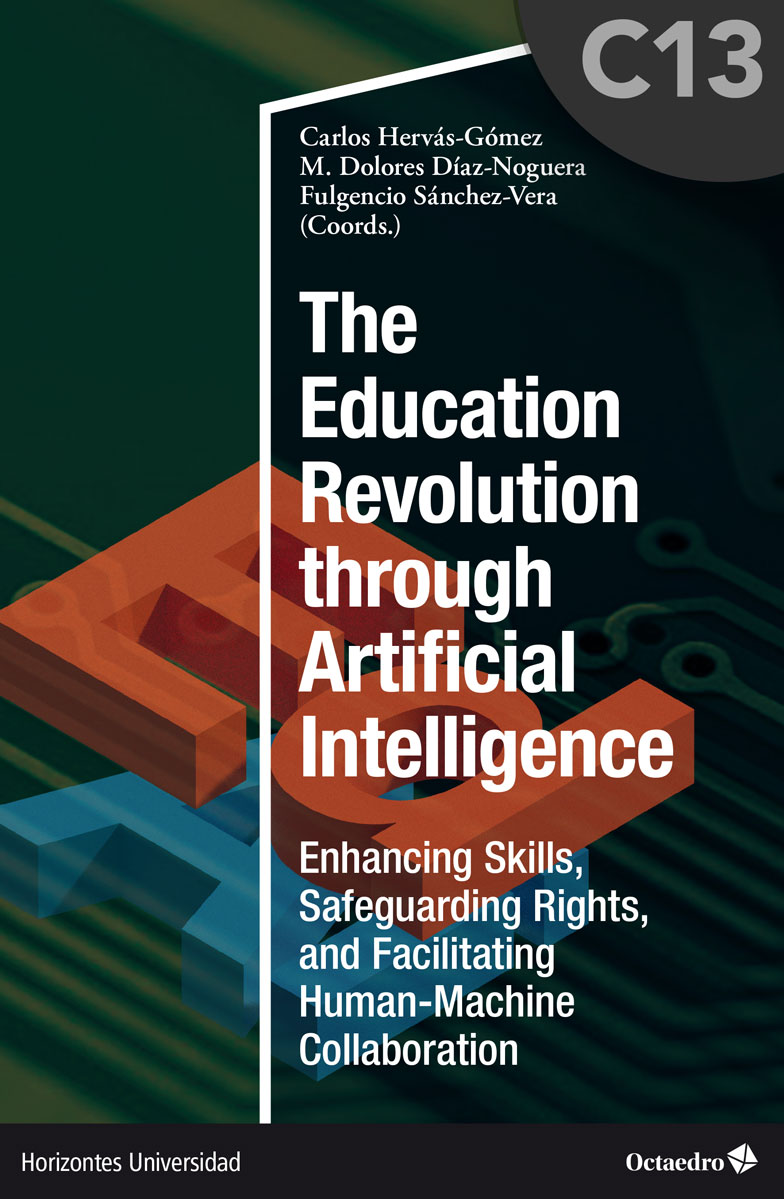FICHA TÉCNICA
Fecha de publicación:
04/11/2024
Doi del capítulo:
Título del libro: The Education Revolution through Artificial Intelligence
URL del libro:
ISBN del libro: 9788410282582
DOI del libro:
Abstract
The use of Artificial Intelligence tools for the creation of educational videos is transforming teaching and learning. It is important to highlight the capacity of these tools to turn written content into attractive animated videos, thereby helping the students to understand the topics. The creative functions promoted by AI, such as text and image generation, color gradation and ultra slow-motion camera, offer new possibilities for the creation of educational content. These technologies not only foster creativity and imagination, but they also stimulate the interest of the students and motivate them to develop skills such as written expression and the construction of descriptive sentences. The dynamic and attractive creation of images and animated videos expands the creative options, enabling the exploration of new ways of presenting the educational contents. In a world at constant technological evolution, it is essential for teachers to make use of these tools to enrich the educational experience and prepare the students for a digitally competent future. As AI continues to evolve, its impact on education is expected to increase, transforming the way in which people teach and learn all over the world.
Palabras clave
Autores
PhD Carlos Hervás-Gómez
University of Sevilla, Spain
hervas@us.es
https://orcid.org/0000-0002-0904-9041
PhD María Dolores Díaz-Noguera
University of Sevilla, Spain
noguera@us.es
https://orcid.org/0000-0002-0624-4079
PhD Emilia Florina Grosu
Babes-Bolyai University, Romania
emilia.grosu@ubbcluj.ro
https://orcid.org/0000-0002-2846-9586
PhD Liliana Mâță
Vasile Alecsandri University of Bacău, Romania
liliana.mata@ub.ro
https://orcid.org/0000-0001-9293-3286
PhD Sonia Gabriela Neagu
Univeristatea Lucian Blaga Sibiu, Romania
soniagabriela.neagu@ulbsibiu.ro
https://orcid.org/0009-0000-3064-5537
María de los Ángeles Domínguez-González
Universidad de Sevilla, Spain
mariandg@us.es
https://orcid.org/0000-0002-9687-9325
Cómo citar
Hervás-Gómez, C., Díaz-Noguera, M, D., Florina Grosu, E., Mâță, L., Gabriela Neagu, S., Domínguez-González, M. Á. (2024). Artificial Intelligence Tools for the Creation of Educational Videos for Teaching. In Hervás-Gómez, C., Díaz-Noguera, M. D., Sánchez-Vera, F. (Coords.), The Education Revolution Through Artificial Intelligence (pp. 195-212). Octaedro. https://doi.org/10.36006/09651-1-13
Referencias bibliográficas
«Adiguzel, T., Kaya, M. H., & Cansu, F. K. (2023). Revolutionizing education with AI: Exploring the transformative potential of ChatGPT. Contemporary Educational Technology, 15(3), ep429. https://doi.org/10.30935/cedtech/13152
Alawi F. (2023). Artificial Intelligence: The future might already be here. Oral Surgery Oral Medicine Oral Pathology Oral Radiology, 135(3), 313-315. https://doi.org/10.1016/j.oooo.2023.01.002
Allam, H., Dempere, J., Akre, V., & Flores, P. (2023). Artificial Intelligence in education (AIED): Implications and challenges. In Johnston et al. (Eds.). Proceedings of the HCT International General Education Conference (HCT-IGEC 2023), Atlantis Highlights in Social Sciences, Education and Humanities (pp. 126-140). https://doi.org/10.2991/978-94-6463-286-6_10
Aoun, J. (2017). Robot-Proof: Higher Education in the Age of Artificial Intelligence. The MIT.
Arslan, K. (2020). Artificial Intelligence and applications in education. Western Anatolia Journal of Educational Sciences, 11(1), 71-88.
Biswas, P., Sameem, M., & Mallick, L. (2023). Role of Artificial Intelligence in digital transformation of education. Journal of Data Acquisition and Processing, 38(2), 985-989. https://doi.org/10.5281/zenodo.776668
Bolatito, A. S. (2024). The affordances of Artificial Intelligence on education. Journal of Harbin Engineering University, 45(2), 76-85.
Bozkurt, A. (2023). Generative Artificial Intelligence (AI) powered conversational educational agents: The inevitable paradigm shift. Asian Journal of Distance Education, 18(1). https://www.asianjde.com/ojs/index.php/AsianJDE/article/view/718
Bozkurt, A.; Xiao, J.; Lambert, S.; Pazurek, A.; Crompton, H.; Koseoglu, S.; Farrow, R.; Bond, M.; Nerantzi, C.; Honeychurch, S. (2023). Speculative futures on ChatGPT and generative Artificial Intelligence (AI): A collective reflection from the educational landscape. Asian Journal of Distance Education, 18(1), 53-130. https://doi.org/10.5281/zenodo.7636568
Domínguez-González, M. D. L. Á., Hervás-Gómez, C., Díaz-Noguera, M. D., & Reina-Parrado, M. (2023). Attention to diversity from Artificial Intelligence. The European Educational Researcher, 6(3), 101-115. https://doi.org/10.31757/euer.633
European Commission, Directorate-General for Education, Youth, Sport and Culture (2022). Ethical Guidelines on the Use of Artificial Intelligence (AI) and Data in Teaching and Learning for Educators. European Union. https://data.europa.eu/doi/10.2766/153756
Fergus, S., Botha, M., & Ostovar, M. (2023). Evaluating academic answers generated using ChatGPT. Journal of Chemical Education, 100(4), 1672-1675. https://doi.org/10.1021/acs.jchemed.3c00087
Grassini, S. (2023). Shaping the future of education: exploring the potential and consequences of AI and ChatGPT in educational settings. Education Sciences, 13, 692. https://doi.org/10.3390/educsci13070692
Ilham, R., Giatman, M., & Maksun, H. (2024). Artificial Intelligence research in education: A bibliometric analysis. Journal on Education, 6(2), 13467-13479. https://doi.org/10.31004/joe.v6i2.5199
Istrate, A. M. (2019). The impact of the virtual assistant (VA) on language classes. In The International Scientific Conference eLearning and Software for Education, 1, pp. 296-301. “Carol I” National Defence University, Bucharest
Jamal, A. (2023). The role of Artificial Intelligence (AI) in teacher education: Opportunities & challenges. International Journal of Research and Analytical Reviews, 10(1), 140-146. https://ijrar.org/papers/IJRAR23A2629.pdf
Kerrigan, J., Cochran, G., Tabanli, S., Charnley, M., & Mulvey, S. (2022). Post-COVID changes to assessment practices: A case study of undergraduate STEM recitations. Journal of Educational Technology Systems, 51(2), 192-201. https://doi.org/10.1177/00472395221118392
Naidu, K., & Sevnarayan, K. (2023). ChatGPT: An ever-increasing encroachment of Artificial Intelligence in online assessment in distance education. Online Journal of Communication and Media Technologies, 13(1), e2023xx. https://doi.org/10.30935/ojcmt/13291
Nipun, M.S., Talukder, M.H., Butt, U.J., Sulaiman, R.B. (2023). Influence of Artificial Intelligence in higher education; impact, risk and counter measure. In H. Jahankhani, A. Jamal, G. Brown, E. Sainidis, R. Fong, U. J. Butt (Eds). AI, Blockchain and Self-Sovereign Identity in Higher Education. Advanced Sciences and Technologies for Security Applications. Springer. https://doi.org/10.1007/978-3-031-33627-0_7
Organisation for Economic Co-operation and Development (2019). Recommendation of the Council on Artificial Intelligence. https://legalinstruments.oecd.org/en/instruments/OECD-LEGAL-0449, accessed 30 January 2024.
Patel V. D., & Shahapurkar G. (2021). Artificial Intelligence applications in higher education. Journal of Advanced Research in Applied Artificial Intelligence and Neural Network, 5(2), 5-9.
Williamson, B., & Eynon, R. (2020). Historical threads, missing links, and future directions in AI in education. Learning, Media and Technology, 45(3), 223-235. https://doi.org/10.1080/17439884.2020.1798995
«
